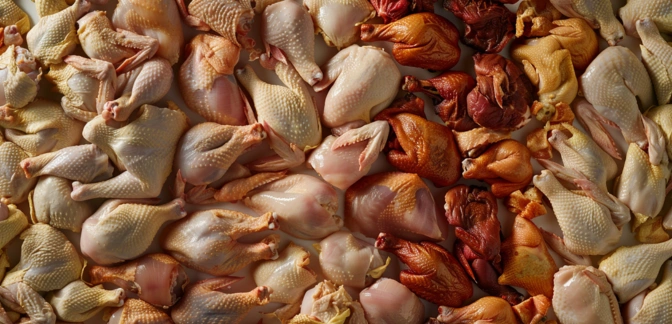Turkey — Nutrients, Health Benefits, And Shopping Tips

Written by Listonic Team
Last update on September 4, 2024
Turkey nutrients
Nutrition facts
Amount per 100 g
Calories
🔥 189 kcal
| Nutrition per: 100 g | Value | % Daily Value* |
|---|---|---|
| Carbs | 0 g | - |
| Fiber | 0 g | - |
| Sugars | 0 g | - |
| Glycemic Index | 0 | - |
| Protein | 29 g | 58% |
| Sodium | 109 mg | 4.74% |
| Total Fat | 8 g | 10.26% |
*The % of Daily Value (DV) tells you how much a nutrient in a serving of food contributes to a daily diet. 2,000 calories a day is used for general nutrition advice.
29 g
💪 High Protein Content
Turkey facts & tips
Health benefits
- High in protein, essential for muscle growth, repair, and overall body function.
- Low in fat (especially lean cuts), making it a heart-healthy option for weight management.
- Contains essential vitamins and minerals such as B vitamins (especially B6 and B12), selenium, zinc, and phosphorus, which support overall health and well-being.
- Supports immune function due to its rich zinc and selenium content.
- Versatile and easy to prepare, making it a convenient addition to a balanced diet.
Health risks
- High sodium content particularly in processed turkey products or pre-seasoned turkey, which can contribute to hypertension and increased cardiovascular risks.
- Risk of contamination with harmful bacteria such as Salmonella or Campylobacter, particularly if the turkey is not properly cooked or stored.
- Potential for high fat content in certain cuts like dark meat, which can raise cholesterol levels and increase the risk of heart disease when consumed frequently.
- Potential for overconsumption due to its palatable nature, leading to excessive calorie intake if not mindful of portion sizes.
How to choose turkey
Turkey should have a smooth, moist skin and firm flesh. The meat should be free from any bruising or excessive injections of marinade or brine, which can affect the texture and natural flavor.
Do not purchase turkey that has dry or patchy skin, as it suggests improper storage or age. Turkey with an off smell or that feels sticky to the touch should also be avoided, as it may be beginning to spoil.

How to store turkey
Fresh turkey should be stored in the refrigerator, tightly wrapped in plastic wrap or butcher paper. Refrigeration maintains its freshness for up to two days. Freezing is recommended for longer storage.
Air exposure can lead to rapid spoilage. Avoid leaving it uncovered or near ready-to-eat foods to prevent cross-contamination. Always thaw frozen turkey in the refrigerator and use clean utensils and surfaces to ensure food safety.
✅ Extra Tip
How long does it last?
Turkey can last for 1-2 days in the refrigerator. For longer storage, turkey can be frozen for up to 6-9 months.
What to do with leftovers?
Leftover turkey can be used in a variety of savory and comforting dishes. Shred it and add to sandwiches, wraps, or salads for a flavorful protein, or mix it into a stir-fry with vegetables and rice. Turkey is also great when added to pasta dishes with a creamy or tomato-based sauce, or used as a topping for pizzas or flatbreads.
Use turkey in a casserole with potatoes, vegetables, and cheese, or mix it into a stew or soup for added flavor and richness. If you have a lot of turkey, consider making a batch of turkey pot pie with a flaky crust, or using it as a filling for tacos, burritos, or quesadillas. Turkey can also be sliced and served over a grain bowl with quinoa, roasted vegetables, and a tangy dressing. For a quick snack, reheat turkey slices and serve with a dipping sauce or on a bed of greens.
👨⚕️️ Medical disclaimer
Discover products from other categories
Listonic Team
Fact-checked
Our editorial team checked this article to make sure it was accurate at the time of publishing it.
Get the top-rated shopping list app

turkey
1 piece







